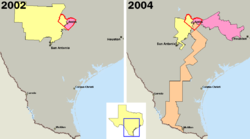Texas Republican legislators’ rebellion against Gov. Greg Abbott’s effort to siphon money from public education and hand it to private schools deserves another notice from this blog.
I already have spoken kindly about rural Republicans’ efforts to block the initiative, citing their belief in the strength that public education brings to their communities. The effort is so united and unbreakable through four special legislative sessions that Abbott appears to have given up on the fight for the time being.
The legislators answer to the voters, not to the political leadership in Austin. For their loyalty to the votes who send them to office, I applaud them.
Their resistance against political leadership reminds me of a struggle that occurred in Washington in the mid-1990s. It involved a West Texas congressman, Republican Larry Combest of Lubbock and his refusal to back the Freedom to Farm legislation pushed by newly installed House Speaker Newt Gingrich.
Combest told Gingrich he opposed the agriculture overhaul effort because the farmers and ranchers who voted him into office opposed it. He would side with the South Plains and High Plains voters who expressed their opposition. One of the effects of the legislation would be to reduce the farm and ranch subsidies that went to those who worked the land.
I applauded Combest vociferously at the time while I worked for the Amarillo Globe-News as editorial page editor. I spoke with considerable passion about the guts Combest displayed in resisting Gingrich. It would cost Combest a coveted chairmanship of the House Agriculture Committee. Gingrich coaxed a retired Republican from Oregon, Bob Smith, to run again for the House and gave him the chairman’s gavel.
Combest eventually asked me to back off on my criticism of Gingrich. “I have to work with these guys,” Combest said. I don’t recall my precise answer, but I believe I said something like, “Too bad, Larry. I’m going to stay on it.”
Combest displayed plenty of backbone then. Texas rural GOP legislators are showing plenty of the same thing now.
Stand tall!






